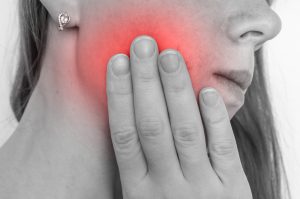 It goes without saying that oral healthcare can be a tricky task to do correctly. In fact, many adults make the common mistake of only paying attention to their teeth when other structures contribute to overall oral health. For instance, your oral cavity is comprised of teeth, gums, roots, tongue, jaw, lips, cheeks, and throat, and it is crucial to care for each factor. In today’s blog, your Conroe, TX dentist will take a look at the way a phenomenon such as teeth-grinding – often something one wouldn’t consider a major problem – can lead to dangerous jaw dysfunction.
It goes without saying that oral healthcare can be a tricky task to do correctly. In fact, many adults make the common mistake of only paying attention to their teeth when other structures contribute to overall oral health. For instance, your oral cavity is comprised of teeth, gums, roots, tongue, jaw, lips, cheeks, and throat, and it is crucial to care for each factor. In today’s blog, your Conroe, TX dentist will take a look at the way a phenomenon such as teeth-grinding – often something one wouldn’t consider a major problem – can lead to dangerous jaw dysfunction.
Incessant Bruxism
While experiencing an instance or two of teeth-grinding is hardly something to bat an eye at, enduring it on a chronic or consistent basis is troubling. Teeth-grinding occurs when an individual consciously or, in many cases, unconsciously clenches their structures tightly and proceeds to move the lower jaw from side to side. During this process, the teeth rub together aggressively and generate friction.
As you can imagine, constant grinding eventually leads to worn-down surfaces. This is especially problematic, because it not only leads to an increased chance of developing chips, cracks, and breaks due to brittleness, but you may experience an increase in bacterial infection.
Another complication that is a direct result of chronic teeth-grinding is the possibility that the situation gets much worse, thus threatening the integrity of your smile. To learn more about this process and what that entails for your teeth, reach out to our office today.
How It Affects You
One of the biggest threats that come from untreated bruxism is the development of a dangerous jaw dysfunction known as TMJ disorder. This phenomenon occurs when the lower mandible experiences so much stress or tension that it becomes misaligned from one or both of the two temporomandibular joints (TMJs) at which it hinges to your cranium.
When a person experiences TMJ disorder, he or she will be subject to difficulty opening the mouth, problems eating or chewing, pain or tension, and a popping or clicking sensation in the jaw. What’s more? Your joints may endure damage as the jaw attempts to realign itself, leading to tissue tearing and harm. To learn more about this phenomenon, reach out to our office.
Using Splint Therapy
While bruxism and TMJ disorder is certainly nobody’s first choice to experience, fortunately, all hope is not lost. Indeed, our team may recommend splint therapy to help guide your jaw back into place with care. What’s more? We can also work with you to find an oral appliance that addresses your bruxism needs.
Learn More Today
Contact The Dental Centre of Conroe in Conroe, TX by calling 936-441-4600 to learn more about the dangers of unchecked teeth-grinding, or schedule your next appointment with our team today.


